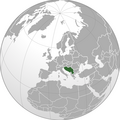Bolivia–Yugoslavia relations were historical foreign relations between Bolivia and now split-up Socialist Federal Republic of Yugoslavia. Relations were established and developed in the context of Yugoslav Non-Aligned policy during the Cold War in which Yugoslavia cooperated with countries both outside Eastern and Western Bloc.
Bolivia |
Yugoslavia |
|---|---|

Bolivia was one of destinations of South Slavic (especially Croat) immigration with many emigrant communities antagonistic attitude towards their country of origin.[1]
Bolivia participated in the 1961 Non-Aligned Conference in Belgrade as an observer state represented by Minister of Education Felma Valorde.[2][3] During his visit to Yugoslavia Foreign Minister of Bolivia signed convention on cultural cooperation while in 1962 Minister of Foreign Affairs of Yugoslavia Koča Popović visited Bolivia and signed expanded version of the convention.[2] In 1963 President of Yugoslavia Josip Broz Tito organized a month long (18 September-17 October) South American tour during which he visited Brazil, Chile, Bolivia, Peru and Mexico.[2]
-
President Josip Broz Tito receiving Ambassador of Bolivia (1968)
See also
editReferences
edit- ^ Ana Rajković (2015). "Opposing the policy of the twenty-first century socialism in Bolivia: the political activities of Branko Marinković". Südosteuropäische Hefte. 4 (2). Retrieved 3 February 2021.
- ^ a b c Vidosava Eraković (2015). "Титова "америчка турнеја" 1963. године – посета Бразилу, Чилеу, Боливији, Перуу и Сједињеним Америчким Државама". Arhiv. XVI (1–2). Archives of Yugoslavia. Retrieved 3 February 2021.
- ^ Bogut, Mirna (2018). Pokret nesvrstanih i Beogradska konferencija (Master's thesis). University of Osijek. Retrieved 3 February 2021.


